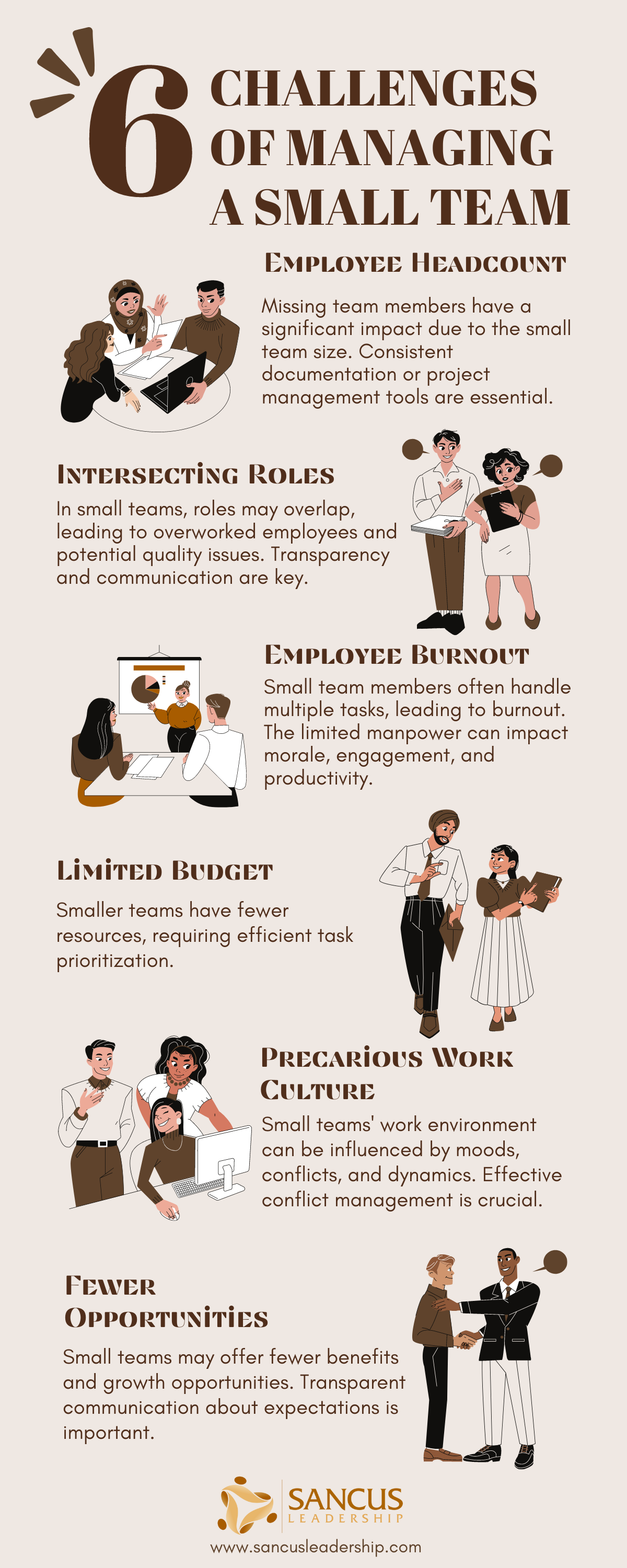Your cart is currently empty!

6 Huge Challenges of Managing a Small Team
Imagine it’s your first day at work managing a small team — Will you feel confident you can do the job exceptionally well because minor team issues are much easier to manage than those of bigger groups? Will you feel at ease because handling fewer people is a breeze? You might be in for a big surprise because managing a small team can be just as challenging and grueling as managing a larger group.
One of the main challenges of managing a small team is the relatively low staffing and resources available. You’ll have to think of efficient ways to handle absenteeism, employee resignation, and a limited budget. You also have to learn to cope with employee burnout and relationship conflicts.
Read on to see what challenges you can expect to face in managing a small team. You’ll also find some nifty tips to ensure your team thrives, grows, and succeeds. Let’s start!
Will a Small Team Challenge Your Leadership Skills?

Small teams are easier to manage, especially since it means fewer people to handle, hardly any organizational hierarchies to consider, and more occasional office politics. However, that is only sometimes the case because small teams also come with pretty big challenges. As a team leader, expect always to be kept up on your toes, just as you would with bigger groups.
If you’re too calm in managing a small team, things could quickly spiral out of control. Remember, you’re dealing with a relatively small group of people, and not giving importance to team morale, engagement, and productivity can directly affect your performance.
On the other hand, exerting effort in helping your small team achieve its goals and reach its full potential will reap big rewards for you. You’ll observe the following:
- Improved team morale
- Improved job satisfaction
- Enhanced engagement
- Enhanced teamwork and collaboration
- Improved team productivity
- Reduced employee turnover
All these will help your small company grow, thrive, and survive in the dynamic and formidable world of business.
Challenges of Managing a Small Team

Like any other business, small teams also have their fair share of challenges. Leaders must be aware of these potential difficulties, especially those taking on this arduous responsibility for the first time.
Below are some of the most inescapable challenges of managing small teams and how you can efficiently navigate through them:

1. Employee Headcount
Missing or losing someone in the team significantly impacts it because only a few people are in it. Whether a team member is absent for just a few days or someone has left the company for good, the entire team will seriously feel the gaping hole they leave behind.
One way to effectively handle this is through proper and consistent documentation. You could secure multiple copies of every plan, proposal, list of new customers, or strategy implemented. However, you will still risk missing critical information when a team member isn’t physically present in the workplace.
Investing in the most efficient project management tools is the most sensible route. These handy business allies can document everything for you, so when a team member skips work for the day or quits their job, you and the rest of the team won’t be left hanging.
Here are some great options to consider for your team:
- Monday.com
- ClickUp
- Asana
- Smartsheet
- HubSpot
- Wrike
- Notion
- Airtable
You can also cross-train your employees so they can be counted on to perform a range of skills and responsibilities in the team. Not only will this be great for the company, but it will also boost your employees’ proficiency and morale. For instance, a team member tasked with conceptualizing marketing strategies would also probably gain a lot from learning about art and design, so they could be counted on to create marketing materials as well.
2. Intersecting Roles
That being said, intersecting roles can seldom be avoided in small teams. Companies can afford to hire individuals for various positions in larger groups.
For instance, a more prominent firm might have a team of product testers whose sole task is to sample each product from the pipeline. In a minor group, the product developers, more often than not, double as the testers.
In this situation, some employees may feel overworked, and some might even harbor feelings of exploitation. This may result in them doing their tasks haphazardly, adversely affecting the team’s productivity and ability to produce high-quality products or services.
The key to navigating this challenge is honesty and transparency with your team. Be upfront and inform your team members about the situation and your expectations early on. If they’re amenable to the arrangement, then all is well. Otherwise, strive to reach an agreement where you and your team member will be happy, and nobody feels shortchanged.
You might have to bring in a new member to the team, train another team member for this specific task, or create partnerships within the group where both individuals serve to complement and augment each other’s skillset.
3. Employee Burnout
If you’re part of a small team, you probably feel like there’s always too much to do but not enough time to get everything done. Team members are also expected to accomplish more tasks and play a wider range of roles than their counterparts from larger teams due to the limited manpower. Wearing multiple hats can certainly take a toll on one’s morale, level of engagement, and drive.
If you’re part of a small team, you probably feel like there’s always too much to do but not enough time to get everything done.
The secret is to systematize and get some of the tasks automated. Here are some tips:
- Use templates whenever applicable.
- Establish standard protocols and processes.
- Outsource certain aspects of the business so your team members can focus on crucial projects and tasks they enjoy doing.
- Use automation tools like Zapier or Integrate.
4. Limited Budget
It can be quite frustrating and constraining always to have to work with limited resources. This is to be expected in smaller teams and, as a leader, you’ll feel the impact even more if you’re used to handling larger groups. The transition might be discomposing, and you might find yourself nonplussed and stumped at times with how to get things done efficiently.
The secret lies in knowing how to prioritize tasks and projects. Make a to-do list and consider these crucial factors when figuring out how to maximize the resources available to you:
- Deadlines. Clearly, looming deadlines take precedence over others.
- Significance. With a limited budget, you might want to allocate more to tasks or projects that are pivotal to your team’s success. With less consequential ones, you can be more creative with regard to execution.
5. Precarious Work Culture
The work environment in small teams can easily be influenced by people’s moods, personalities, work ethics, and changing circumstances. One minute, team members can be highly engaged, collaborative, and productive — and the next, the atmosphere could quickly change and make them distant, uncooperative, and uninspired. Conflicts are among the main culprits in upholding the team’s dynamics.
The work environment in small teams can easily be influenced by people’s moods, personalities, work ethics, and changing circumstances.
Effectively leading a team calls for you to be adept at conflict management. As a leader, you must be able to handle conflicts because unresolved disputes can affect your team’s synergy, collaboration, and productivity effectively.
Relationship conflicts and personality clashes, in particular, are extremely tricky to navigate. Although open communication can reduce the friction brought about by these factors, a 2007 study on the role of conflict resolution in teams indicated that conflicts from personality differences never really go away.
Instead, survey respondents stated that they focused on creating collaborative structured processes, rotational responsibilities, and establishing a more transparent work culture to make things work.
At Sancus Leadership, we’ve helped countless businesses face the challenges of leading small teams. We recognize the urgency of resolving conflicts, especially within small teams where teamwork and collaboration are essential to success. When you’re ready to learn more about efficiently handling disputes in your team, book a free leadership consultation!
6. Fewer Opportunities and Benefits
Some people might steer clear of small teams because they generally offer fewer benefits, lower pay, and fewer growth opportunities compared to their larger counterparts. This may lead you to face a scarcity of highly skilled employees and a high employee turnover rate.
When managing a small team, you must be straightforward with your team members and prospects. Communicate to them exactly what’s in store for them in your team and what they can expect to get out of it.
When managing a small team, you must be straightforward with your team members and prospects.
Bank on the extensive range of experiences and training they can accumulate. Highlight the opportunities they can take advantage of when personally meeting with clients, interacting with experts in the industry, and building their business network. Shine the spotlight on how they can grow and evolve with the company.
| Challenges of Managing a Small Team | Description |
| 1. Employee Headcount | Missing or losing a team member in a small team has a significant impact due to the limited number of people. Proper documentation is important, but investing in project management tools can help mitigate the risk of critical information loss. |
| 2. Intersecting Roles | Small teams often face intersecting roles, where employees have to perform multiple tasks. Openness and transparency are crucial to manage this challenge, ensuring employees are comfortable with their roles and responsibilities. |
| 3. Employee Burnout | Limited manpower in small teams means team members are expected to handle more tasks and roles, leading to potential burnout. Morale and engagement can suffer due to the increased workload and variety of responsibilities. |
| 4. Limited Budget | Small teams work with constrained resources compared to larger groups. Prioritizing tasks and projects becomes essential for efficient resource utilization. |
| 5. Precarious Work Culture | Mood, personalities, and conflicts can influence the work environment in small teams. Effective conflict management is vital to maintain a productive and collaborative atmosphere. |
| 6. Fewer Opportunities | Small teams may offer fewer benefits, lower pay, and limited growth opportunities, potentially leading to difficulties in attracting and retaining skilled employees. Clear communication about prospects is crucial for managing expectations. |
High-performance coach Brendon Burchard, in this video, shares some valuable tips on how you can effectively manage your team.
Key Takeaways
When it comes to business, bigger isn’t always better. Given the best manpower, adequate resources, and excellent leadership, a small team can easily carve a niche for itself in the market and become one of the most successful businesses in the industry.
As a leader, it’s your responsibility to be prepared to face the challenges that will come your way. It’s pretty simple — be open and honest with your team, provide the support they need to thrive, be willing to compromise, know how to maximize resources wisely, and always be keen on fostering a collaborative culture within the team.
